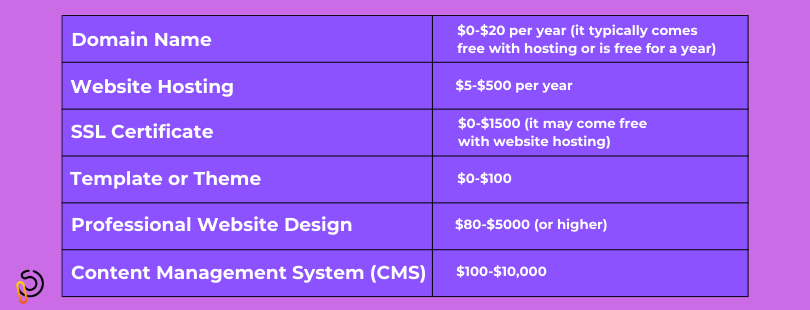Building a website for a small business costs anywhere between $500 and $20,000, depending on its type, features, and functionalities. Multiple factors are at play and will determine your satisfaction with the outcome.
However, an effective and responsive website is non-negotiable for every business that wants a presentable online storefront that can reach a wider audience. Since the price range is ample and the process includes various details, we’ll break down what it takes to develop a good site in 2024.
Small Business Website Cost in a Nutshell
Website development is more complex than it may seem, as you must meet multiple requirements. First, you must register your domain name and choose a website hosting company.
Then, you must decide whether you’ll use a website-building platform and build it yourself or you’ll hire experienced professionals. You will likely have to acquire an SSL certificate to authenticate your website’s identity and ensure you can use an encrypted connection.
Keep in mind that you might need additional add-ons, such as SEO and an e-commerce portal. Whether you include those plugins can often impact the final price, as fewer crucial components translate into a cheaper solution.
However, always aim for a comprehensive and fully functional website that feels safe and credible for users to get their information or purchase services and products. All in all, what does your website need to have, and how much would that cost?

Let’s dive into each of these in more detail.
Domain Name
A website domain is a unique address that helps find and identify your website online, similar to physical addresses in the real world. It serves as the internet “home” for your business, providing a memorable and easy-to-find location for visitors to access and consume your online content.
Registering a domain starts with choosing a name and extension (such as .com, .org, or .net) that reflects your website’s identity and purpose. The next step is to purchase it from a domain registrar. This process typically involves checking the availability of the desired domain, selecting a registration period (usually one to ten years), and providing contact information.
Once you register, the domain is leased to you for the chosen period, allowing exclusive use for hosting your website and email services.
Website Hosting
Website hosting is a service that makes your website accessible on the internet. It’s a virtual storage space where website files, databases, and other content are stored and served to visitors when they access your website through its domain name.
The process starts with choosing a hosting provider and a suitable hosting plan based on the website’s requirements, such as storage space, bandwidth, and technical features. That typically involves signing up for an account with the hosting provider, choosing a domain name to associate with the hosting account (if you haven’t already registered it), and configuring settings for the website.
The following are the most common website hosting types:
- Shared Hosting: This budget-friendly option allows multiple websites to share resources on a single server. But while it’s cost-effective and easy to manage, its shared nature means performance may fluctuate based on other sites’ activities, making it best suited for small businesses with low to moderate traffic and resource needs.
- Virtual Private Server (VPS) Hosting: VPS hosting offers more control and flexibility by partitioning a physical server into multiple virtual servers, each with dedicated resources. This solution enables good performance and scalability, making it ideal for small businesses experiencing growth or requiring specific configurations to accommodate higher traffic volumes and resource-intensive applications.
- Dedicated Hosting: With this hosting, you get exclusive access to an entire physical server, synonymous with maximum control, security, and performance. As a result, it’s ideal for small businesses with high-traffic or resource-intensive websites that rely on dedicated resources and customizable configurations to meet specific needs.
- Cloud Hosting: This option leverages a network of interconnected virtual servers to host websites. It could be a good solution if you have volatile traffic or unpredictable resource needs, as you can dynamically scale resources up or down based on demand, resulting in optimal performance and cost-effectiveness.
- WordPress Hosting: As a solution for hosting WordPress websites, it provides helpful features such as one-click installation, automatic updates, and specialized support. You may choose it if you use WordPress as your CMS, as it offers simplicity and performance tailored to WordPress sites’ requirements.
SSL Certificate
This digital certificate encrypts data transmitted between a user’s web browser and a website’s server. As a vital security measure, it keeps sensitive information such as passwords, credit card details, and personal data confidential and protected from unauthorized access or interception.
You can purchase one from a trusted Certificate Authority (CA) or a web hosting provider. That typically requires generating a Certificate Signing Request (CSR) from the website’s server, submitting it to the CA, and completing a validation process to verify the website’s ownership and legitimacy.
Template or Theme
A website template is a pre-designed layout or framework, an essential foundation for building a website. As such, it’s a convenient starting point for creating a professional and visually appealing online presence without extensive coding or design skills.
Website templates typically include design elements such as headers, footers, navigation menus, and content sections, which you can customize and populate with relevant text, images, and multimedia content to suit the website’s purpose and branding. You can choose a suitable template from a website builder platform or marketplace, tailor it to your preferences using an intuitive editing interface, and publish the finished website.
Professional Website Design
Website design is a strategic process allowing you to create visually appealing, functional, and user-friendly websites tailored to your unique business needs and objectives. It’s critical for a robust online presence and credibility, essential components in attracting potential customers and driving conversions.
You can collaborate with skilled web designers or agencies experienced in user experience (UX) design, graphic design, and web development, or do it yourself if you have the necessary skills. Regardless of the method, your website design should reflect your brand’s personality and values and have an intuitive and engaging user experience.
Content Management System (CMS)
This software application (e.g., WordPress as the best one for business sites) is a centralized platform for website digital content creation, management, and publishing. It enables swiftly updating and organizing various content types, including text, images, videos, and documents, without being a coding wizard or a tech expert.
Thanks to that, these platforms provide intuitive interfaces and tools that streamline content creation, editing, and collaboration processes and allow multiple users to contribute and manage content simultaneously.
You might still wonder how much a website should cost for a small business. The following assessment plan should help you make an estimate.
Calculating the Average Cost of a Web Design for Small Business
Once you’re familiar with all the factors you must consider, it’s easier to anticipate the small business website cost.
Being able to answer the following questions will help you prepare a plan with good foundations.
1. What are the Specific Goals of Your Website?
Start by defining your website’s primary purpose. You may want it to showcase your products and services or to generate leads. On the flip side, your website might have the role of providing information or facilitating online sales.
Extensive objectives often mean specialized functionalities, potentially requiring additional development time and resources, leading to higher costs.
2. What is Your Target Audience?
You must understand your target audience’s demographics, preferences, and behaviors to tailor the website’s design, content, and functionality to their needs. Complex requirements may result in more customization and user experience improvements, which implies a more expensive project.
3. Which Features Should Your Website Have?
Be clear about the must-have features and functionalities (e.g., booking systems, product galleries, membership portals) your website should have and write them down. The more plugins your website must have, the higher initial and maintenance expenses.
4. Should Your Website Have eCommerce or Web App Functionalities?
Consider whether your website will require e-commerce functionality, including shopping carts, payment gateways, inventory management, and order processing. Moreover, you may consider building a web application if you want interactive features to provide a more personalized user experience. This can lead to higher upfront and ongoing costs.
5. Do You Have Content Creation Resources?
Does your business have in-house resources for content creation, or do you need external professionals, such as copywriters, photographers, or videographers? If the latter is the case, you’ll have to hire them, contributing to the final website cost for your small business.
6. What’s Your Timeline for Development and Launch?
Be clear on what’s a realistic timeline for the website’s development, testing, and launch. When deciding your timeline, consider complexity, scope, resource availability, and desired launch date. Remember that tighter timelines may require extra resources or expedited development processes, potentially increasing costs due to rush fees or overtime expenses.
7. What’s Your Budget Range?
Set a website development budget and consider upfront design, development, and content creation costs to avoid overspending or not having enough. Other things to include in your project are ongoing hosting and maintenance.
For instance, you can use business intelligence tools to gather market insights and understand customer preferences to assess the website development plans and budgets.
8. Will You Hire a Professional Website Developer and Designer or Do It Yourself?
The most economical solution is to choose a pre-built theme and develop the website independently. However, that requires skills and knowledge for the site to look and perform the desired way.
You can also collaborate with a web development company or freelancers who can help you complete your project faster and hassle-free. Those projects typically start at $1000.
Taking All in Consideration, How Much Does a Small Business Website Cost?
Although you can find low-cost solutions and get a simple site with limited features and functionalities for $500, more complex, personalized sites cost more. According to Tech Report, the average cost of building a website for a small business ranges between $2,000 to $10,000.
Meanwhile, GoodFirms highlights $3200 as the median small business website cost. Remember, features, functionalities, UI/UX design, CMS, and responsiveness will ultimately determine the price.
That’s why you must start by deciding your unique website requirements and whether you’ll hire an experienced web development company. Once you have that straight, contact your top picks and get a personalized quote.
FAQ
Q: Is it worth making a website for a small business?
A: Yes, making a website for a small business is more than worthwhile, as it helps improve its online visibility, credibility, and accessibility to potential customers, resulting in increased brand awareness and conversions.
Q: How much does it cost to make a website for a small business?
A: The cost of building a website for a small business typically ranges from $500 to $20,000, depending on factors such as type, features, and functionalities, with the average falling between $2,000 and $10,000.
Q: What are the factors to consider when developing a website for a small business?
A: When building a small business website, consider the cost of domain name registration, website hosting, SSL certificate, template or theme selection, professional website design, CMS, timeline, and your budget.





